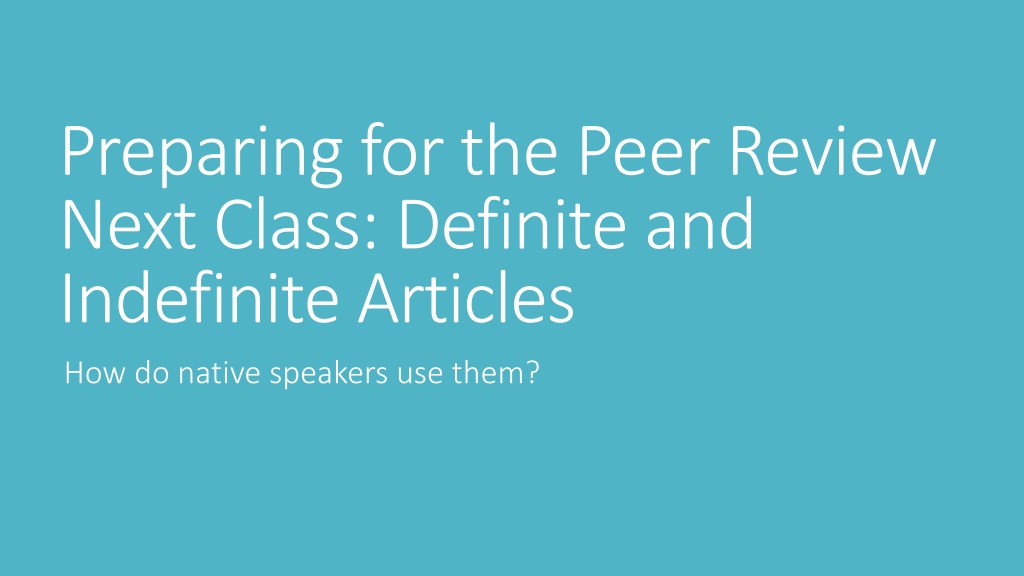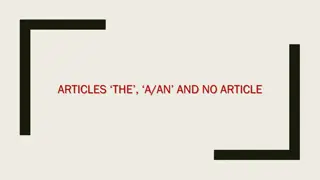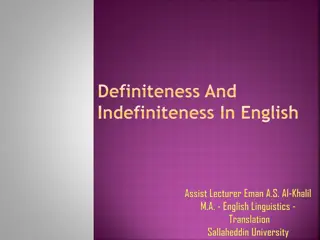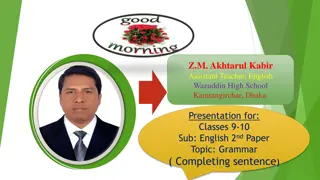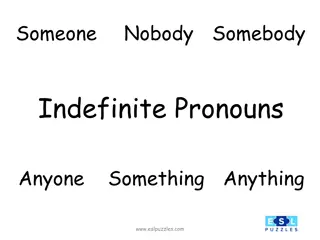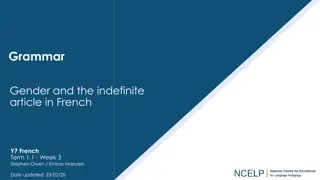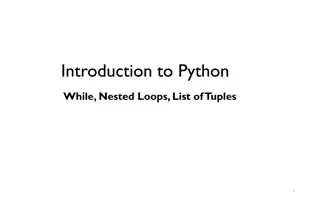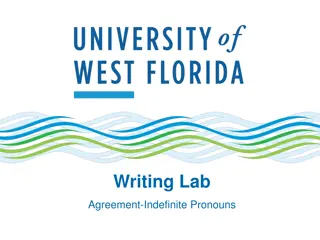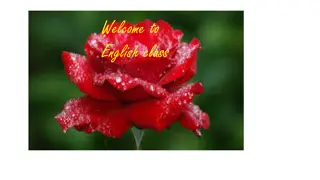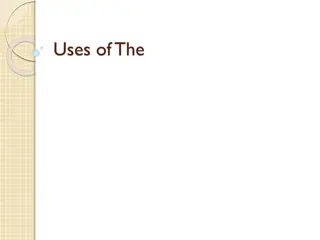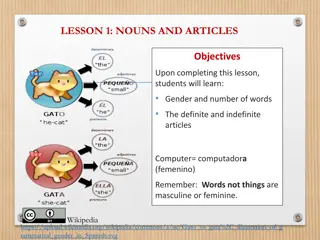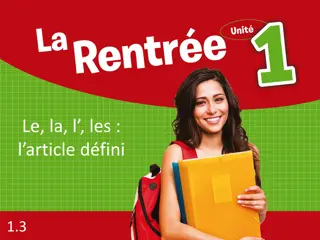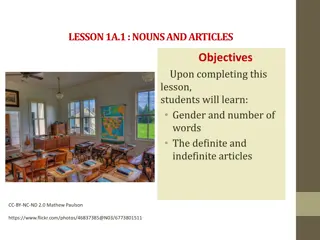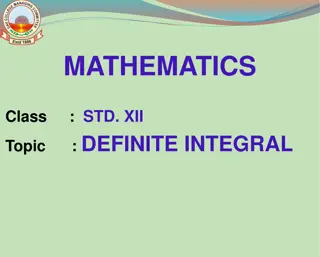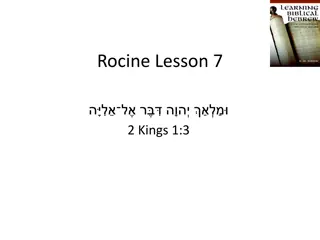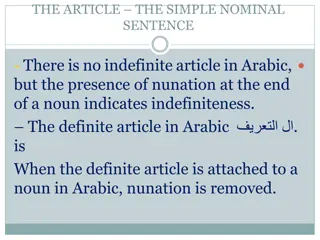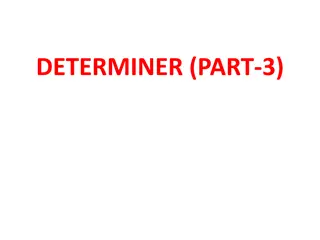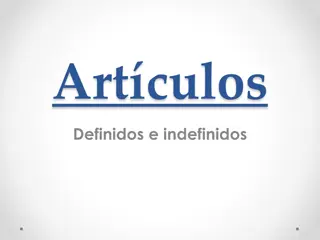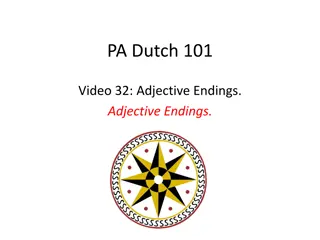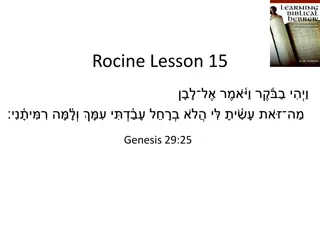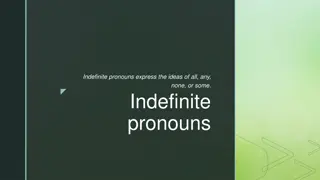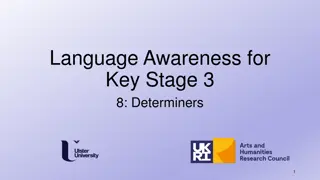Mastering Definite and Indefinite Articles in English Grammar
Delve into the intricacies of definite and indefinite articles in English grammar through understanding their usage with examples and pretests. Learn how native speakers employ articles to convey particularity or generality before nouns, differentiate between specific and nonspecific items, and grasp the significance of count nouns in sentence construction.
Download Presentation

Please find below an Image/Link to download the presentation.
The content on the website is provided AS IS for your information and personal use only. It may not be sold, licensed, or shared on other websites without obtaining consent from the author. Download presentation by click this link. If you encounter any issues during the download, it is possible that the publisher has removed the file from their server.
E N D
Presentation Transcript
Preparing for the Peer Review Next Class: Definite and Indefinite Articles How do native speakers use them?
In English grammar, what are articles? Articles are short words that always come before a noun and communicate the relative particularity or generality of the noun. Particular items: Particular items: The university (Penn State) The university (Penn State) T The house (my house) he house (my house) General items: General items: A university (any university anywhere in the world) A university (any university anywhere in the world) A house (any house in the world) A house (any house in the world)
Definite vs. Indefinite vs. No Article No Article Definite Article Indefinite Article The A or An -> No article is used when you are speaking about an abstract concept or are talking about objects in general. -> Used for particular or specific items, usually when the reader already has heard of this item or concept. -> Used for non- specified items, when you are speaking about them in general or introducing them the first time.
Pretest 1 on articles: Deciding when to use a, an, the, or no article Which of the following sentences use articles incorrectly? List them in your notebook, and rewrite them. 1. 1. 2 2. . 3 3. . 4 4. . 5 5. . 6 6. . I would like a pencil. I would like a pencil. I want donut today. I want donut today. Pen is on desk. Pen is on desk. I need the pencil. I need the pencil. She needs chair. She needs chair. Please turn off light. Please turn off light.
What do all of these nouns from the pretest have in common? Pencil Donut Pen Chair Light
They are all count nouns because you can count them individually. Pencil: one pencil, two pencils Donut: one donut, two donuts Pen Chair Light
There are 4 correct ways to use most count nouns (with and without an article): 1. Correct: I have a pencil. 2. Correct: I have the pencil. 3. Correct: I have the pencils. 4. Correct: I have pencils. 5. Incorrect: I have pencil.
How is the meaning different in each sentence? 1. Correct: I have a pencil. 2. Correct: I have the pencil. 3. Correct: I have the pencils. 4. Correct: I have pencils. 5. Incorrect: I have pencil.
Pretest 2 on articles: Deciding when to use a, an, the, or no article Which of the following sentences use articles incorrectly? List them in your notebook, and rewrite them. 1. 1. 2 2. . 3 3. . 4 4. . 5 5. . 6 6. . It It is good to have a wisdom. is good to have a wisdom. He has He has intelligences intelligences. . The language in the essay is effective. The language in the essay is effective. I like grammars. I like grammars. A health is very important. A health is very important. Physics is my favorite Physics is my favorite subject subject. .
What do these nouns have in common concerning their grammatical usage? 1. 1. 2 2. . 3 3. . 4 4. . 5 5. . 6 6. . wisdom wisdom intelligences intelligences language language in the grammar grammar health health physics physics in the essay essay
These are all usages of non-count nouns because technically they are too abstract to count one-by-one: 1. 1. wisdom wisdom 2 2. . intelligence intelligence 3 3. . language language in the in the essay essay 4 4. . grammar grammar 5 5. . health health 6 6. . physics physics
NOTE: Some nouns can be used as non-count or count nouns, but the meaning will differ. I think the hardest part about English is that there are many words that can be either countable or non-countable, and the meanings of countable and non-countable forms are different in very significant ways. The essay s language language is clear. He speaks a language (using language speaking a language or speaking languages) language I don t understand. Physical activity activity is good for your health. Creative activities (Engaging in activity in general doing particular activities) activities are good for children and adults.
If you are using a non-count meaning for a word, there are usually only two ways to use it correctly: Correct: The intelligence of my dog is amazing. (Using the definite article the ) Correct: intelligence is a difficult concept to define. (No article) Incorrect: The healths of the people are good. Incorrect: A health is important. Incorrect: Healths are low in this country.
Conclusion: a, an, the, and no article Steps for editing article usage: 1. Pay attention to all the nouns nouns. 2. Ask yourself, is there an article in front of the noun, and why type is it? 3. Is the noun plural or singular? 4. Is the noun intended to be a count noun count noun or a non non- -count noun count noun? 5. Does this noun make sense in the current form and usage? Remember that if you forget to use the correct article, a native English speaker will wonder about which which item or concept you are talking about.
